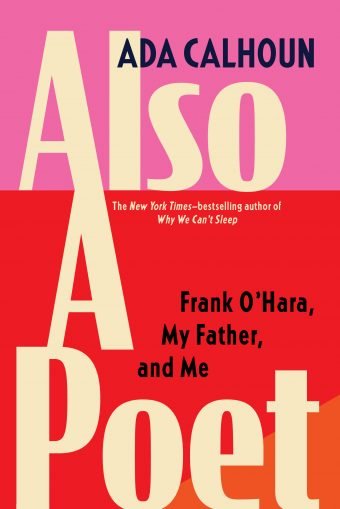
26 Jun Book Review of Also a Poet: Frank O'Hara, My Father, and Me
Book Review: Also a Poet: Frank O’Hara, My Father, and Me by Ada Calhoun
Sometimes, the books that call to us are those that promise an intersection of the personal and the poetic. Ada Calhoun’s Also a Poet: Frank O’Hara, My Father, and Me caught my attention precisely for that reason. A daughter grappling not only with her father’s legacy but also with a luminary like Frank O’Hara? I was instantly intrigued. What could be more fascinating than the struggle to find one’s voice while illuminating the life of a poetic icon?
Calhoun sets out on a daring journey—one that wraps around her father, Peter Schjeldahl’s unfinished ambition to write a biography of O’Hara, the renowned New York School poet. Unfortunately, family obstacles, namely the obstinacy of O’Hara’s sister, Maureen Granville-Smith, thwart any attempt at a traditional biography. The result is a book that defies easy categorization; it oscillates between biography, memoir, and something intriguingly hybrid. And as a reader, I found this blend to be not only resonant but emotionally charged.
Calhoun weaves in her father’s taped interviews with those who knew O’Hara, giving the narrative an authentic undertone while simultaneously revealing her own struggle and introspection. I found her reflections on the relationship with her father, a figure both celebrated and enigmatic, to be especially poignant. This gives the book an unexpectedly tender dimension, exploring the complexities of familial love amid unfulfilled aspirations. As someone who has often pondered the shadows cast by parental expectations, Calhoun’s journey resonated deeply with me.
The pacing reflects this duality; the first half leans more heavily into biography, unveiling O’Hara’s life and artistic context through snippets pulled from the tapes. Just as I felt immersed in exploring O’Hara’s vibrant world, the narrative pivots into memoir territory, where Calhoun candidly discusses her fraught relationship with her father. This shift feels necessary, as if our own journey through understanding O’Hara’s spirit cannot be complete without examining the emotional undercurrents of a father-daughter dynamic fraught with imperfections.
I was particularly charmed by Calhoun’s thoughtful inclusion of various excerpts from O’Hara’s poetry—especially her favorite, “To the Harbormaster.” This poem’s exploration of yearning and self-doubt echoes the very struggles Calhoun faces, making it a perfect touchstone for the themes of her book. The way she reads into the text felt like a conversation with a friend who understands the nuances of familial love and disappointment.
The book doesn’t shy away from the complicated, sometimes alienating world of artistic ambition, particularly when weighed against personal relationships. I was left pondering the age-old question: why do artistic fathers often struggle to show love, even when their children tread the same creative paths? Calhoun’s journey for a “separate peace” feels both universal and intimate.
If you find yourself drawn to poetry, the idiosyncrasies of family relationships, or the eclectic New York artistic scene of the mid-20th century, then you will undoubtedly appreciate Also a Poet. It’s a peculiar yet beautiful exploration—part biography, part memoir, fully a testament to the complexities of love and legacy. For those of us grappling with similar themes, it provides not just insight into O’Hara but also an avenue for reflection on our own familial ties.
In the end, Calhoun’s narrative left me contemplating my own relationships and legacies, serving as a gentle reminder that our paths to understanding each other are often tangled, yet profoundly enriching. I encourage anyone curious about poetic lives or the rich inner worlds that relationships can produce to pick this book up. You won’t be disappointed.
Discover more about Also a Poet: Frank O'Hara, My Father, and Me on GoodReads >>









